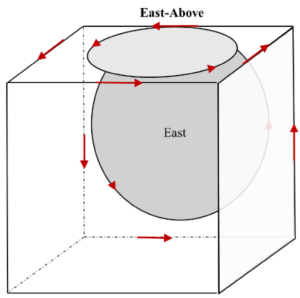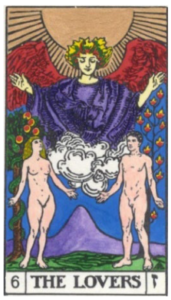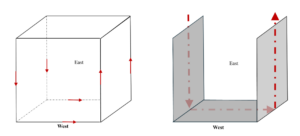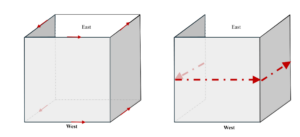Frater A.D.E.N.
Introduction
This blog post describes a simple technique to memorise the current flow directions within the cube of space.
The current flow directions may be recalled by four rules, which can be invoked by remembering one key point: the symbolism within Key 6, THE LOVERS, defines the direction of East-Above.
The Tarot Fundamentals course deals extensively with various attributes of the cube of space. Included in the course are detailed descriptions of certain current flows which are said to flow along the 12 edges of the cube. At first sight the directions of these currents can appear confusing and complex. This is not the case. Indeed, the currents follow a very logical sequence that can easily be remembered by recognising four basic patterns of activity.
These patterns of current flow are described below and are summarised into four simple rules.
The Patterns of Current
The flow of currents around the edges can be classified in two ways:
- circular currents;
- current bands.
Two circular currents

Two faces of the cube can be characterised by a circular current flow. When the cube is viewed from the West, the East and the Above faces exhibit an anticlockwise flow of current (Figure 1). To recall the direction of these two circular currents, see that the line East- above is common to both, and therefore defines the direction of both circular currents.
In addition, note that the current direction of East-above is South to North and that this direction is indicated within the symbolism of Tarot Key 6.

Recall that for most TAROT keys, the viewer is looking into the East (exceptions being Keys 10, 16, 17 and 18). In Key 6, the Man looks, or projects toward the Woman. Therefore, the current projects from the right side of the Key (representing South) into the left side of the Key (representing North), that is, from South to North.
Thus, in the recognition of these two patterns of circular flow seven current directions have been defined:
|
Edge |
Current Direction |
Edge |
Current Direction |
|
East-Above |
South to North |
||
|
North-Above |
East to West |
North-East |
Above to Below |
|
West-Above |
North to South |
East-Below |
North to South |
|
South-Above |
West to East |
South-East |
Below to Above |
The next section describes two “bands” of current that can be used to recall the current directions within the remaining 5 edges.
Two Bands of Current
In addition to the circular currents, two bands of current flow may be defined. Figure 2 shows that from North-Above, a band of current flows down the North face, (via North-East and North-West) under the bottom face, (via East-below and West-below) and up the South face (via West-south and East-south). Therefore, the recognition of this pattern identifies 6 current flows by deduction. This pattern of current flow can be considered as a ribbon flowing from Above down the North face, under the bottom face (Below) and up the South face.

Figure 3 shows that a similar activity occurs from the East face. That is, a band of current flows along the North face, around the West face and returns to East via the South face.

Therefore, these two rules define 12 current directions:
| Edge |
Current Direction |
Edge |
Current Direction |
|
North-East |
Above to Below |
North-Above |
East to West |
|
North-West |
Above to Below |
North-Below |
East to West |
|
Below-East |
North to South |
West-Above |
North to South |
|
Below-West |
North to South |
West-Below |
North to South |
|
South-East |
Below to Above |
South-above |
West to East |
|
South-West |
Below to Above |
South-below |
West to East |
Summary
The 12 currents around the edges of the cube can be memorised with four simple rules:
- A circular current flows around the Above face, where the direction of circulation is defined by East-above or Key 6.
- A circular current flows around the East face, where the direction of circulation is defined by East-above or Key 6.
- A current band emanates from Above down the North face, along the face of Below and returns via the South face.
- A current band emanates from East along the North face, along the West face and returns via the South face.
If the reader were to meditate on the implications of these current flow patterns, interesting conclusions are sure to follow. For example, it is noteworthy that both current bands described begin their path from the Northern face, traverse Below or West and complete their path via the South. In addition, note that the overall path of the circular current which flows around East and Above describes a “Figure 8”.
